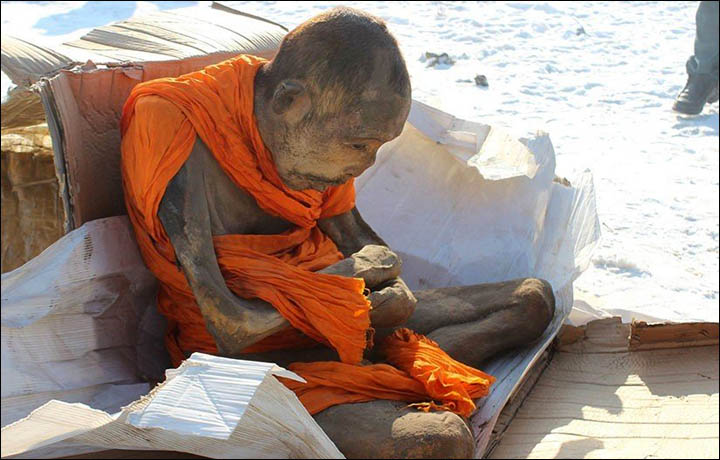Mongolian mummified monk ‘was disciple of one of great Buddhist teachers’
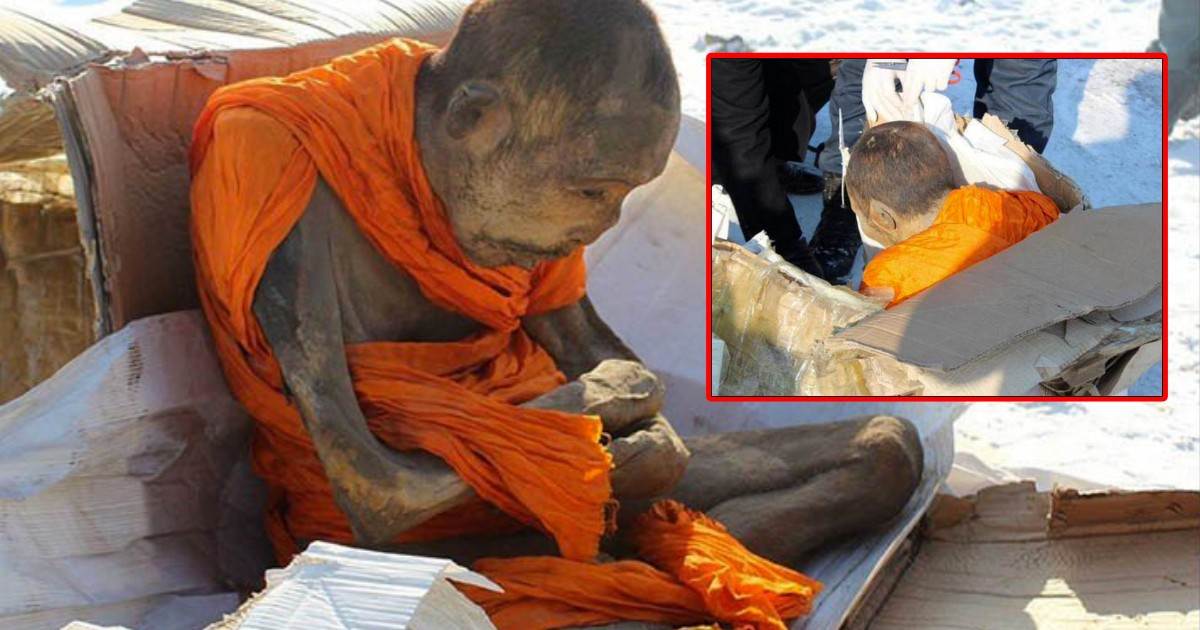
Identity revealed of incredible 200-year-old remains found in lotus positon amid reports criminal planned selling him for 10 million roubles.
Lead researchers are certain the body is that of a bearded religious man called Tsorzh Sanzhzhav, who lived 200 years ago. Picture: Morning Newspaper
New details have emerged about the identity of a mummified monk whose remains were found in the lotus position in Mongolia.
The Mongolia Morning Newspaper has reported that lead researchers are certain the body is that of a bearded religious man called Tsorzh Sanzhzhav, who lived 200 years ago.
According to experts, he was a disciple of one of the greatest Buddhist teachers that ever lived and had been buried alongside his elder master until being stolen two weeks ago.
It is now believed he was a student of His Holiness Incarnate Ovgon Geser Lama, who is revered in the region and whose grave is visited annually by pilgrims wishing to pray.
His identity was discovered after police paid a visit to the cave high in the mountains of the Arkhangai district of Mongolia and found his mummified body to be missing.
An investigation is under way into the theft and a criminal case is being prepared against a 45-year-old unnamed man, who had planned to smuggle them over the border. Local media reports he wanted to sell them for 300 million tugriks (10 million roubles/£100,000).
Lead researcher Ganhugiyn Purevbat, who is the founder and professor of the Mongolian Institute of Buddhist Art at Ulaanbaatar Buddhist University, said he is certain the remains are those of the great elder lama’s disciple.
He said: ‘When I first learned about the unusual discovery, I sent people to check in Arkhangai, suspecting that it might be imperishable body of Tsorzh Sanzhzhav, a disciple of Geser Lama. I had hoped that I was mistaken about Sanzhzhav.
‘However, the special committee found that the imperishable body and the shrine does belong to Tsorzh Sanzhzhav.’

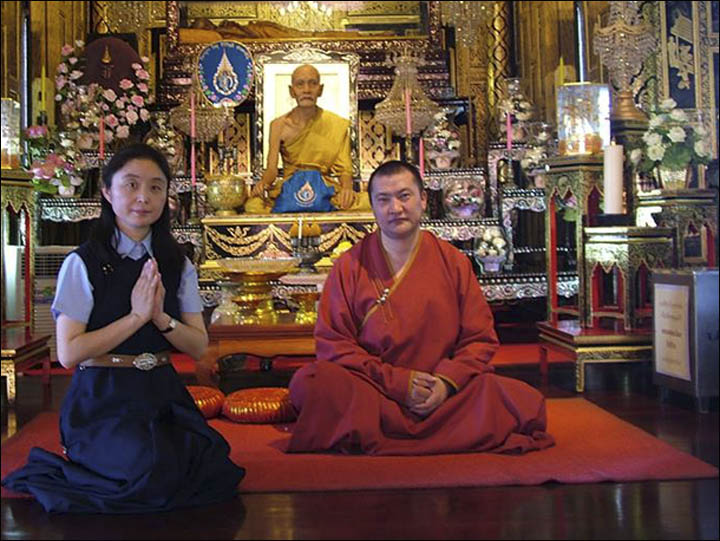
Lead researcher Ganhugiyn Purevbat, who is the founder and professor of the Mongolian Institute of Buddhist Art at Ulaanbaatar Buddhist University, said he is certain the remains are those of the great elder lama’s disciple. Picture: Ganhugiyn Purevbat
The mummified remains of the disciple, which were covered in cattle skin, were found on January 27 in the Songinokhairkhan province of Ulaanbaatar in Mongolia.
Investigators travelled to Sodnomdarzhaa Mountain, 50km from the Tsakhir in the Arkhangai district, where they found the tomb from where body had been stolen.
On opening the burial chamber, 2,000 metres above sea level, they found only one body inside a wooden box, that of the Geser Lama.
The Geser Lama had lived near Khukh Nuur Lake and when he died in about 1890, he passed away while meditating. His body was cleaned and embalmed with a special solution then dried for a year, with his resting place becoming a shrine.
Like his recently-found student, he died in the lotus position and was placed in a wooden box, which was then buried and surrounded in stones. His disciples took him to the top of Sodnomdarzhaa Mountain by camel, where they buried him according to his wishes and to the rituals of the time.
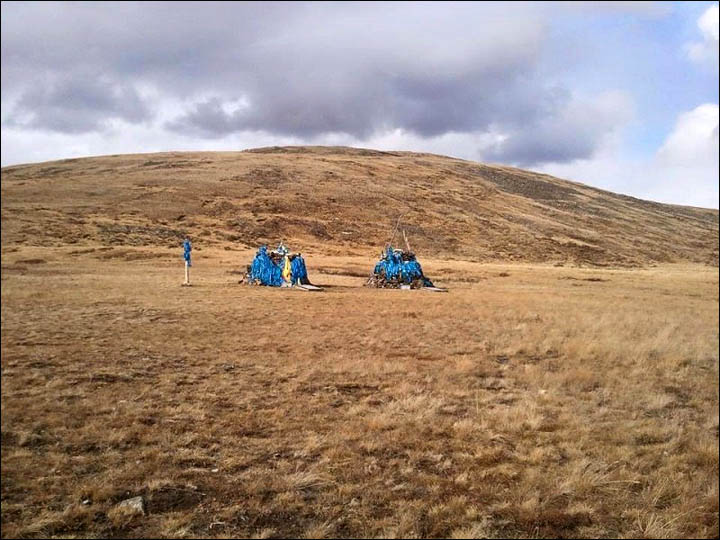
Burials of His Holiness Incarnate Geser Lama and his disciple Tsorzh Sanzhzhav on Sodnomdarzhaa Mountain, 50km from the Tsakhir in the Arkhangai district. Picture: Today.mn
Believed to be 25 years younger, the student was taught everything he knows from his lama master and he left a will asking to be entombed beside him upon his own death. Mr Purevbat said their tests on the mummy have allowed them to build a picture of the monk in life, and in his death.
Last week there was speculation that the monk was not dead and was instead in ‘very deep meditation’ in a special spiritual state known as tukdam. But now he said this has proved to be unfounded.
He said: ‘Earlier I said that maybe Lama is not dead but was in very deep meditation in the ancient tradition of Buddhist lamas. But it is not so. Tsorzh Sanzhzhav and his teacher were specially buried in this form.
‘Tsorzh Sanzhzhav was a close disciple of His Holiness Incarnate Geser Lama, who lived about 200 years ago. We see that he passed away at the age of about 70 years. He had a black beard and a large hooked nose, his height was about 180cm.
‘In 1999, the local lamas restored part of his head and chest that had been damaged by birds and stones from the mountains or by the light when the wooden parts of the box [housing him] were broken and these parts of the body left out.’
The expert said that the remains will be cleaned and taken back to the mountain.
During the police investigation into the theft, officers managed to locate a descendant of the mummy’s lama teacher and he is also convinced the body belongs to his ancestor’s pupil.
The man, called Batchuluun, said: ‘On the night of January 28, people from the district administration, police and security services came to our home, and asked us to lead them to the burial place of Geser Lama and his disciple.
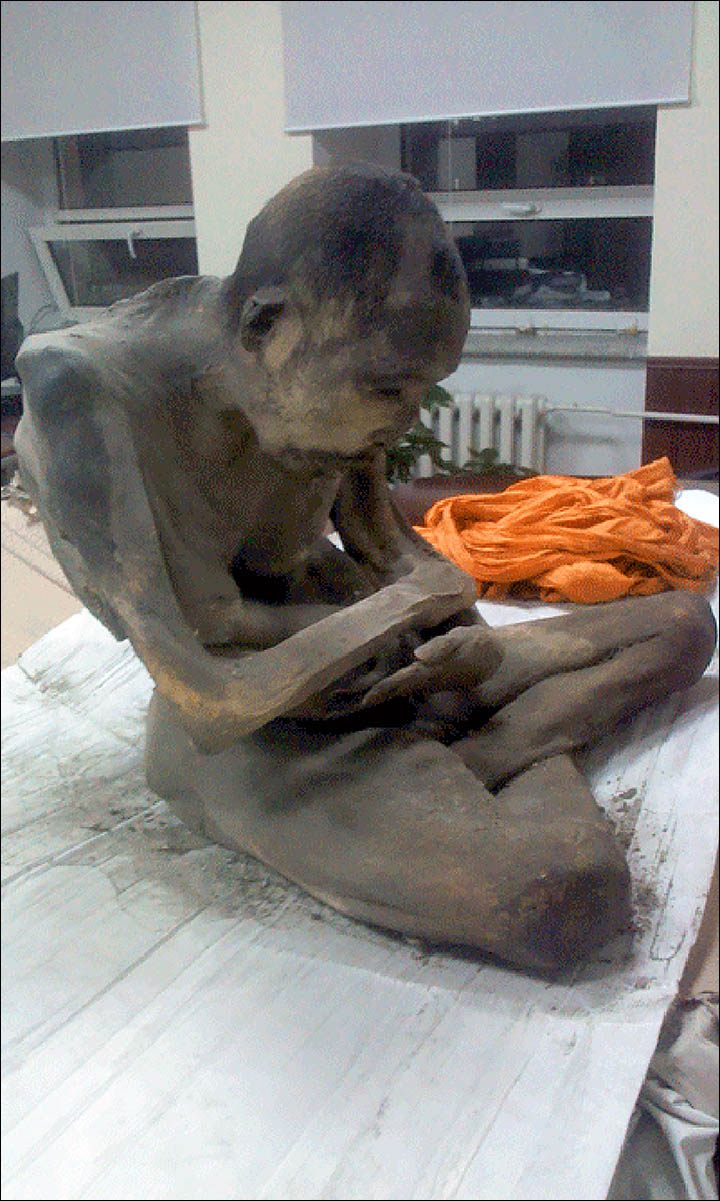
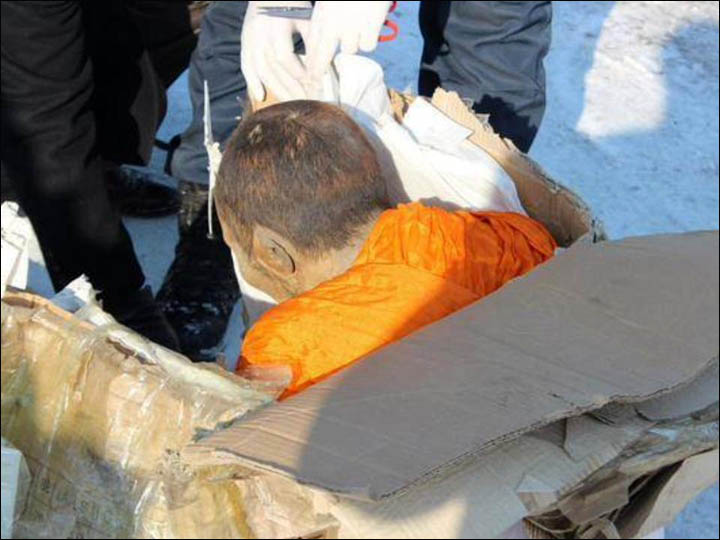
Tsorzh Sanzhzhav passed away at the age of about 70 years. He had a black beard and a large hooked nose, his height was about 180cm. Pictures: Morning Newspaper
‘There they took a lot of photos and video footage. I told them not to touch the burial site. If they really wanted to do that, they needed to come with researchers and related monks.
‘I have a painting of Geser Lama that I keep at home and don’t show to the public. I saw the photograph of the mummy that was found and it looks familiar in some ways.’
He added: ‘Geser Lama lived over two hundred years ago. He was one of the biggest lamas, and I am one of his descendants. Things that were used by him are placed around my home. My parents told me about him. Every year many people from different soums and provinces would visit the mountain to pray at his burial site.’
When he last visited the site in 2000 Batchuluun said he saw two bodies, with the remains of the disciple able to be seen through the box. The monk’s head and shoulders were visible, and there was evidence that they had been pecked at by birds, so he repaired the damage to the casket and replaced the stones.
He added: ‘The mummy [found recently] looked very similar to the one I saw in the mountain.’
Police are remaining tight-lipped about the progress of the investigation into the man who had planned to sell the mummy.
Colonel B Baatarkhuu, director of public relations at the General Police Department, said: ‘The investigation process, as well as the full examination of the mummy, is still underway.
‘A team was assigned to the case recently, which includes researchers, scientists, and the staff from Ministry of Justice, Ministry of Education, Culture and Science. The team will work on the issue and an official announcement will be made by them.’
The monk is now being guarded at the National Centre of Forensic Expertise at Ulaanbaatar, where visitors are now turning up to pray, believing it to be a holy deity.
‘It looked like it was alive,’ said one man. “There was no cold aura about it. It is wonderful that the mummy has hair, a beard, hands, fingers and ears. The overall colour was grey and brownish.’
Related Post
A shocking documentary proves that mermaids do exist
SHOCKING Revelation: Thuya, Mother of Queen Tiye, Was the Grandmother of Akhenaten and Tutankhamun—What Ancient Egyptian Secrets Did She Leave Behind?
Breaking News: Astonishing Discoveries at Karahan Tepe Confirm an Extraterrestrial Civilization is Hiding on Earth, and NO ONE Knows!
Breaking News: Researchers FINALLY Discover U.S. Navy Flight 19 After 75 Years Lost in the Bermuda Triangle!
NASA’s Secret Investigation: Uncovering the Astonishing Mystery of the UFO Crash on the Mountain!
Explosive UFO Docs LEAKED: Startling Proof That Aliens Ruled Ancient Egypt!
